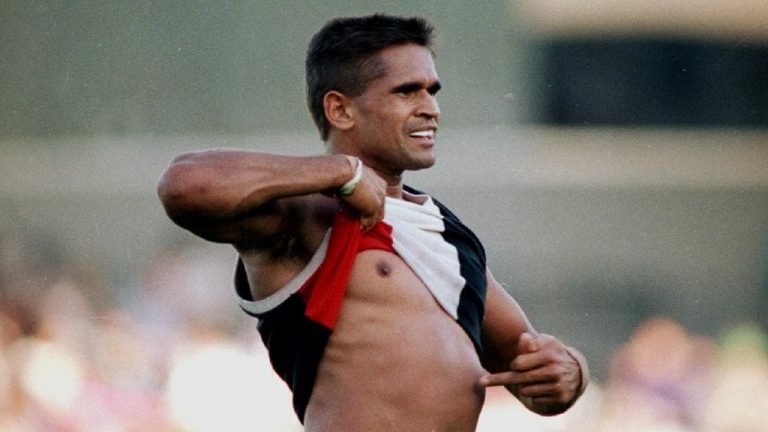There were many memorable moments in 1993. Shane Warne delivered the ‘ball of the century’. Yahoo Serious released Reckless Kelly. And on the 17th of April at Victoria Park, after he and Gilbert McAdam had been on the receiving end of racism from the Collingwood Magpies cheer squad, Nicky Winmar lifted his shirt, pointed to his skin and said, “I am black, and I am proud to be black”.
Many look back and think of how courageous Winmar was, how it was the defining moment that changed racism in the AFL forever but the truth is: nothing changed. Photographers Wayne Ludbey and John Feder even had to fight with their editors at the Sunday Age and the Sunday Herald Sun to get the pictures they took of Winmar the distinction they merited. Collingwood President Allan McAlister stated he had no issues with Aboriginals “as long as they conduct themselves like white people” and the AFL promised to create a code of conduct for players and teams, but it was just talk. It wasn’t until 1995 when Michael Long made an official complaint about racial vilification from Collingwood player Damien Monkhorst that the ball on the code of conduct really got rolling. Michael Long gathered the other Indigenous players, and together they called for institutional change, forcing the AFL to act.
Now, imagine if none of them had done anything, how long would have it taken for the AFL to act independently?


Fast forward to today. Nic Natianui and Liam Ryan have both been targeted. Majak Daw has been a victim. Eddie Betts has dealt with racism several times. Travis Varcoe has suffered from it and Paddy Ryder has also experienced it. Is there even a non-white player that hasn’t been in the crosshairs? Harry O’Brian, now known as Heritier Lumumba, was a Collingwood player who had to deal with the nickname ‘chimp’ just to fit in. Heritier became the focal point in the documentary, Fair Game that looked at racism in the AFL, but even that wasn’t enough to change anything.
So how did it all go so wrong within the AFL that another documentary, The Final Quarter, this time about Adam Goodes, was made? It began in 2013 during the Indigenous round (of all rounds) when a 13-year-old girl called Goodes an ‘ape’. Goodes heard the remark and immediately stopped and addressed the racist comment. Since then, crowds began to boo Goodes; almost like his 372 games, 2 Brownlow medals, 2 Premierships, 4 All-Australians, and 3 Bob Skilton Medals, meant nothing at all. The media went into a frenzy, and it appeared that nobody could handle what Goodes had done. To stir even more drama, during the 2015 Indigenous round, Goodes performed a war dance in front of Carlton fans. It sent the crowds white fragility into overdrive. Let’s be clear, Goodes performed an Indigenous dance, during Indigenous round, and it upset white people.


So, what, inherently, is the difference between what Winmar and Goodes did?
To people who suffer from racism, absolutely nothing. They are both on-field moments where an Indigenous player has stood up in the face of racism. They’re both inspiring and courageous moments. They’re both moments where an Aboriginal player has taken it upon themselves to make a difference because the AFL just does not seem to do enough.
Personally, I would say that Goodes actions were even more courageous. Winmar lifted his jumper and pointed to himself after the siren. Goodes stopped play and pointed directly to the problem. In this case, the problem was a 13-year-old white girl being racist. It’s unfortunate that she was a minor, but is that Goodes fault? Not at all. But it is proof of how ingrained racism is in our society. That such a young girl would freely say such a thing, probably without the full knowledge of what she is saying – just a product of her environment. It could just as easily have been a 40-year-old white male, but they seem to prefer the cover of a fake profile on any AFL Facebook page though. Visit any AFL page and mention Goodes and the words flog, sook, wanker, whinger all come to the surface, the irony being that all those people are doing, is whinging. Those words may not be racist, but it’s still abuse.
It’s almost always followed by “it’s not racist to boo” or “I’m so sick of this PC bullshit”. Really, sick of it? Is it so bad to treat people with respect? Either way, it really was ugly – Goodes shouldn’t have to rock up to his workplace every week and deal with that, and it was his workplace. It’s not some random guy rocking up to some random place with a soap box and a megaphone. Adam was in his workplace, dealing with issues that affect him directly (unlike all the sooks on Facebook). If I rocked up to the workplace of anyone that booed Adam Goodes and ridiculed them for the better part of 3 hours, I think I know what reaction I’d get, and it certainly wouldn’t involve gratitude.
It is easy to argue that the whole issue was not caused by racism, that Goodes took it all too far, that the girl should not have been kicked out of the stadium, that booing is ok because it happens occasionally to others. But the absolute core of the situation, is racism, and the fact is, if Goodes was white, none of it ever would have happened. And if there is one thing that the history of racism in the AFL has taught us, it’s that white people can’t seem to deal with the stress of a black man standing up for himself.


